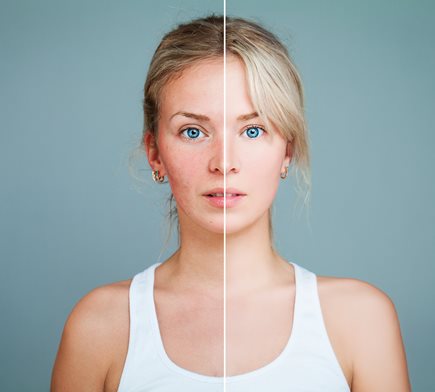Having Rosacea is Nothing to Blush About
April is National Rosacea Awareness Month 
Throughout the ages, many people have considered a “rosy” complexion beautiful. However, for the more than 16 million Americans who suffer from rosacea, which gives the face – especially the cheeks and nose – an excessively flushed appearance, the condition may be a source of distress and embarrassment.
Eventually, rosacea may also affect the ears, neck, chest and back.
Interestingly, most of those who have rosacea may not even know they have it.
What are the Signs of Rosacea?
The most common sign is facial redness that flares up, and gradually becomes ruddier and more persistent — like a sunburn that doesn’t go away. Bumps and pimples may develop. Although they may look like acne, they aren’t. Blood vessels may become more visible and cause facial burning, stinging, and swelling. Sometimes, the eyes are also affected, creating a bloodshot appearance. In severe cases, the skin may thicken, especially around the nose.
Mild rosacea can progress to more severe symptoms if not treated. If you have signs of rosacea, schedule an appointment today with one of Advanced Dermatology's dermatologists, who will customize a treatment plan specifically for you. We have excellent treatments available, including laser therapy, and stay on the leading-edge of medical advances in rosacea treatment.
BOOK ONLINE 866.400.3376
Causes and Triggers of Rosacea
Rosacea is thought to be caused by a genetically abnormal release of inflammatory chemicals from skin cells. These substances are normally released in response to infection.
Rosacea makes the skin so sensitive that many common things can trigger it and cause it to flare (although they do not actually cause the rosacea itself). Some common triggers appear in the graphic below.
 How to Prevent Flare-Ups
How to Prevent Flare-Ups
- Think sun protection (at least 30 SPF)
- Reduce stress
- Avoid overheating
- Rethink hot beverages
- Observe alcohol’s effects
- Dial down spicy foods
- Carefully select skin and hair care products
- Use rosacea-friendly makeup
- Check out your medicines with the doctors who prescribed them if you think they could be causing flares
- Protect your face from wind and cold
- Keep cool while exercising
- Treat your rosacea
Knowing what triggers your rosacea – and making some simple changes – can help you:
- Reduce flares
- Get better results from treatment
- Prevent rosacea from worsening
Book an appointment online or call 866.400.3376 DERM to schedule a consultation with one of our dermatology professionals who will help explore the best rosacea treatment options for you.
*Sources include the National Rosacea Society and American Academy of Dermatology